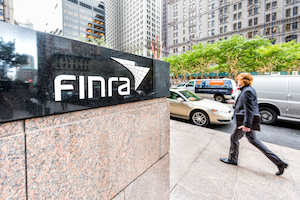 In publishing its 2023 report on examinations and risk monitoring, the self-regulatory organization reminds stakeholders that Regulation Best Interest (Reg BI) and Form CRS remain key areas of focus across its regulatory operations programs.
In publishing its 2023 report on examinations and risk monitoring, the self-regulatory organization reminds stakeholders that Regulation Best Interest (Reg BI) and Form CRS remain key areas of focus across its regulatory operations programs.
To provide firms with more information regarding these regulations, the 75-page report sets forth updated observations of FINRA’s review of firms’ compliance with Reg BI and Form CRS. Member firms should regularly review and update their approach to compliance with Reg BI and Form CRS, taking into consideration new interpretive guidance the SEC continues to issue, the report advises.
Among the new observations with respect to Reg BI and Form CRS include the following. FINRA notes that it will share further findings as it continues to conduct exams and gather additional information on firms’ practices.
Failure to comply with Reg BI’s care obligation by:
- Recommending transactions that were excessive considering retail customers’ investment profiles and factors such as high cost-to-equity ratios and high turnover ratios.
- Limiting consideration of cost solely to sales charges instead of also considering other relevant costs and fees, such as product- or account-level fees, when recommending a product.
- Not maintaining profile information for retail customers in accordance with Exchange Act Rule 17a-3(a)(35), undermining the firm’s ability to demonstrate compliance with the Care obligation.
- Failing to conduct a reasonable investigation of offerings prior to recommending them to retail customers.
Failure to comply with the conflict-of-interest obligation by:
- Not identifying, disclosing or eliminating conflicts of interest associated with recommendations of securities transactions or investment strategies involving securities.
- Not identifying and mitigating conflicts of interest that create an incentive for an associated person to make securities recommendations that place the interests of the associated person or the firm ahead of the interests of the customer, including:
- not properly supervising or enforcing policy restrictions on certain types of recommendations (e.g., transactions in affiliated private funds) intended to mitigate or eliminate potential conflicts; and
- not identifying and mitigating potential conflicts regarding revenue or fee sharing arrangements with fund managers for offerings that were recommended to customers.
Form CRS
Among the new observations regarding Form CRS are failing to deliver or not creating a record of the date on which a firm provided each Form CRS to each investor, including any Form CRS provided before such investor opened an account.
In addition, firms apparently have departed from the Form CRS instructions and guidance by:
- omitting material facts (e.g., description of services offered, limitations of the firm’s investment services, and incomplete or inaccurate cost disclosures); and
- inaccurately representing the firm’s or its financial professionals’ disciplinary histories, including inappropriate qualifying language to explain disciplinary history.
New Topics
Overall, FINRA’s report covers 24 topics—including four new ones. The report also summarizes additional findings from recent examinations, outlines effective practices that FINRA observed, and provides additional resources that may help member firms fulfill their compliance obligations.
“The report addresses topics that remain perennially important, with updates to reflect evolving risks, industry trends and findings from FINRA’s recent oversight activities,” said Greg Ruppert, FINRA’s Executive Vice President, Member Supervision. “This year, we have also increased the breadth of the report’s coverage by adding several new topics focused on insights originating in our market surveillance activities.”
To that end, the new topics include manipulative trading; fixed income–fair pricing; fractional shares; and Regulation SHO. Additionally, the report introduces a new Financial Crimes section, consisting of Cybersecurity and Technological Governance; Anti-Money Laundering, Fraud and Sanctions; and Manipulative Trading.
Cybersecurity. In noting that cybersecurity threats continue to be one of the most significant risks facing customers and firms, the report discusses FINRA’s focus on cybersecurity, including the establishment of the Cyber and Analytics Unit to proactively address the increasingly sophisticated cyberthreat landscape, the impact of cyber-enabled fraud activity including on investors in the crypto-asset market, and FINRA’s increased outreach to firms to make them aware of cybersecurity threats.
Mobile Apps. The report also discusses FINRA’s observations of potential issues with some mobile apps, including apps that do not adequately distinguish between products and services of the broker-dealer and those of affiliates or third parties (such as transactions involving crypto assets). And it touches on mobile apps’ disclosures and explanations of higher-risk products or services, such as certain options and margin lending activities.

